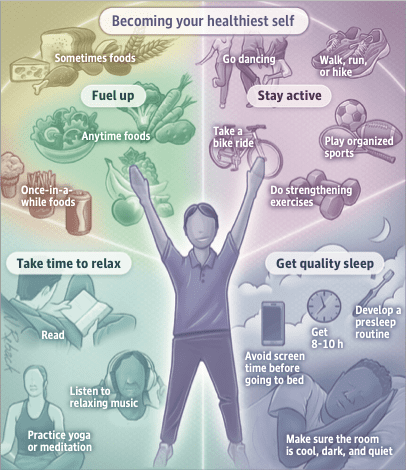Parents, empower your adolescents so they can make choices that promote their healthiest self.
Teens, getting older means making decisions about what matters to you most. Making healthy choices is a great place to start. Taking care of your physical, emotional, and mental health is what makes it possible for you to do all the things you want to do.
Fuel Up
You are in charge of what you eat and drink. The traffic light sys- tem can be a helpful tool in guiding your food and drink choices. It divides foods by the colors of a traffic light: green (anytime foods) is for low-calorie foods that are high in nutrients and can be eaten freely (fruits and vegetables); yellow (sometimes foods) is for foods that are high in calories but also high in nutrients (nuts, cheese, and grains); red (once-in-a-while foods) is for high- calorie foods that do not provide a lot of nutrients (desserts, fried foods, and soda). Eat on a smaller plate (like a salad plate) and make half of your plate fruits and vegetables. Make water your beverage of choice. If you are able, see a registered dietitian to help you achieve your nutrition goals.
Get Moving
Being active helps you to feel and sleep better. Aim for 60 min- utes of physical activity a day. Most of the activity should make you breathe harder and get your heart rate up. Walking, biking, dancing, swimming, participating in organized sports, and weightlifting are a few ways to get moving and your heart pump- ing. The important thing is to find something you love to do and stick with it.
Chill Out
Teens often feel stressed by school, work, and other things that come up. You can manage your stress by exercising, eating a healthful diet regularly, and getting enough sleep. Engaging in relaxation techniques such as meditation and yoga and decreasing negative self-talk can re- duce your stress. Make a date with yourself to do something you love each day that decreases stress. Activities such as yoga, reading, call- ing a friend, listening to music, writing, or spending time with a pet can help with stress management.
Catch Some Zzzs
Getting enough good-quality sleep is an important part of staying healthy. Aim for 8 to 10 hours of sleep each night. Remove televi- sions and screens from your room, including your cell phone.
Set Goals
Learning how to set and stick to goals is an important life skill. First, identify your goal and write it down. List the things that need to be completed to obtain that goal, and start working on tasks that will help you toward that goal. When your goal has been met, treat your- self with a nonfood reward, such as spending the day with a friend, buying yourself a new water bottle, or going on a hike.
Authors: MichelleCardel, PhD, MS, RD; AaronS.Kelly, PhD; Lindsay A. Thompson, MD, MS
Published Online: May 26, 2020. doi:10.1001/jamapediatrics.2020.1243
Author Affiliations: Department of Pediatrics, University of Florida, Gainesville (Cardel, Thompson); Department of Health Outcomes and Biomedical Informatics, University of Florida, Gainesville (Cardel, Thompson); Department of Pediatrics, University of Minnesota, Minneapolis (Kelly).
Conflict of Interest Disclosures: Dr Cardel reports grants from National Institutes of Health during the conduct of the study; personal fees from WW outside the submitted work; and serves as a consultant for Novo Nordisk but does not accept personal or professional income for this activity. Dr Kelly reports nonfinancial support from AstraZeneca and unpaid consulting for Novo Nordisk, Vivus, and WW outside the submitted work. No other disclosures were reported.
The JAMA Pediatrics Patient Page is a public service of JAMA Pediatrics. The information and recommendations appearing on this page are appropriate in most instances, but they are not a substitute for medical diagnosis. For specific information concerning your child’s medical condition, JAMA Pediatrics suggests that you consult your child’s physi- cian. This page may be photocopied noncommercially by physicians and other health care professionals to share with patients. To purchase bulk reprints, email reprints@ jamanetwork.com.

